Module 6 A trip to the zoo重点归纳与解难探究(含答案)
文档属性
| 名称 | Module 6 A trip to the zoo重点归纳与解难探究(含答案) |
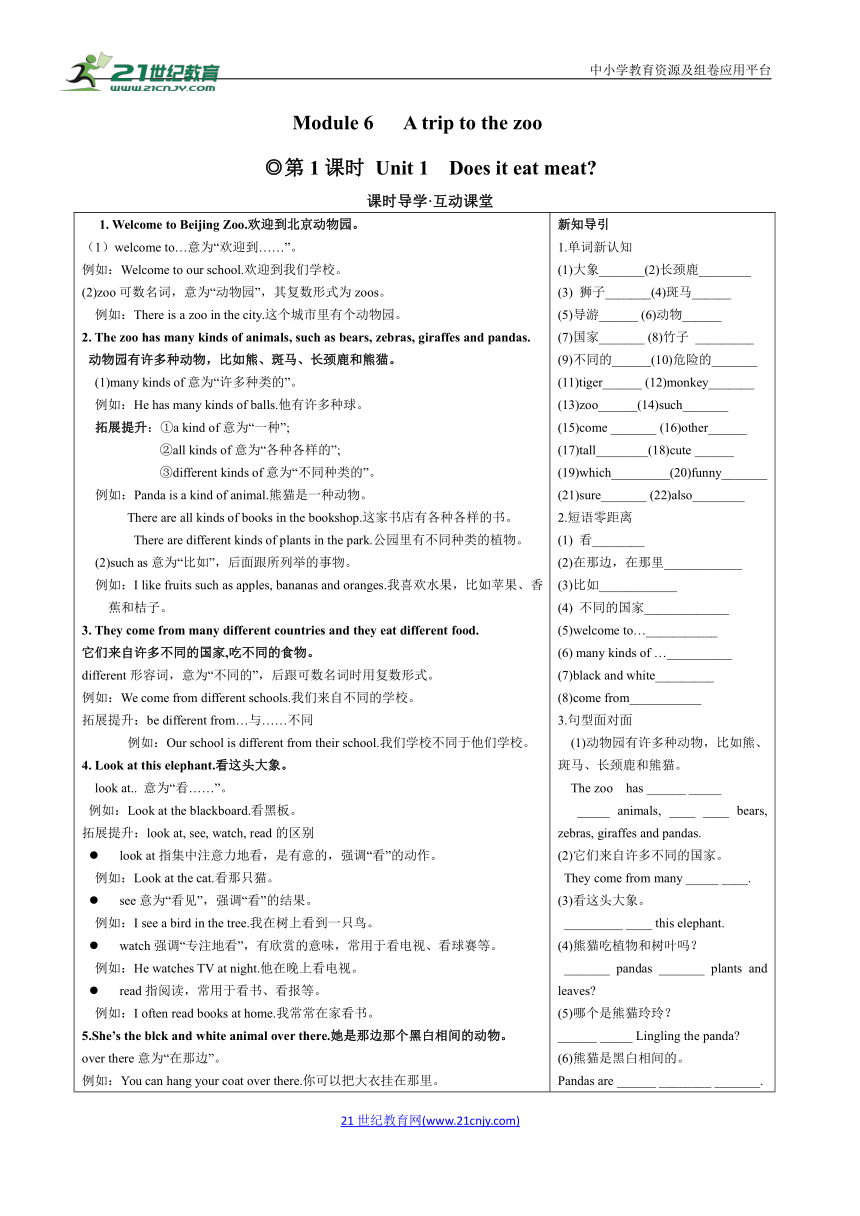
|
|
| 格式 | zip | ||
| 文件大小 | 1.4MB | ||
| 资源类型 | 试卷 | ||
| 版本资源 | 外研版 | ||
| 科目 | 英语 | ||
| 更新时间 | 2018-11-21 00:00:00 | ||
图片预览

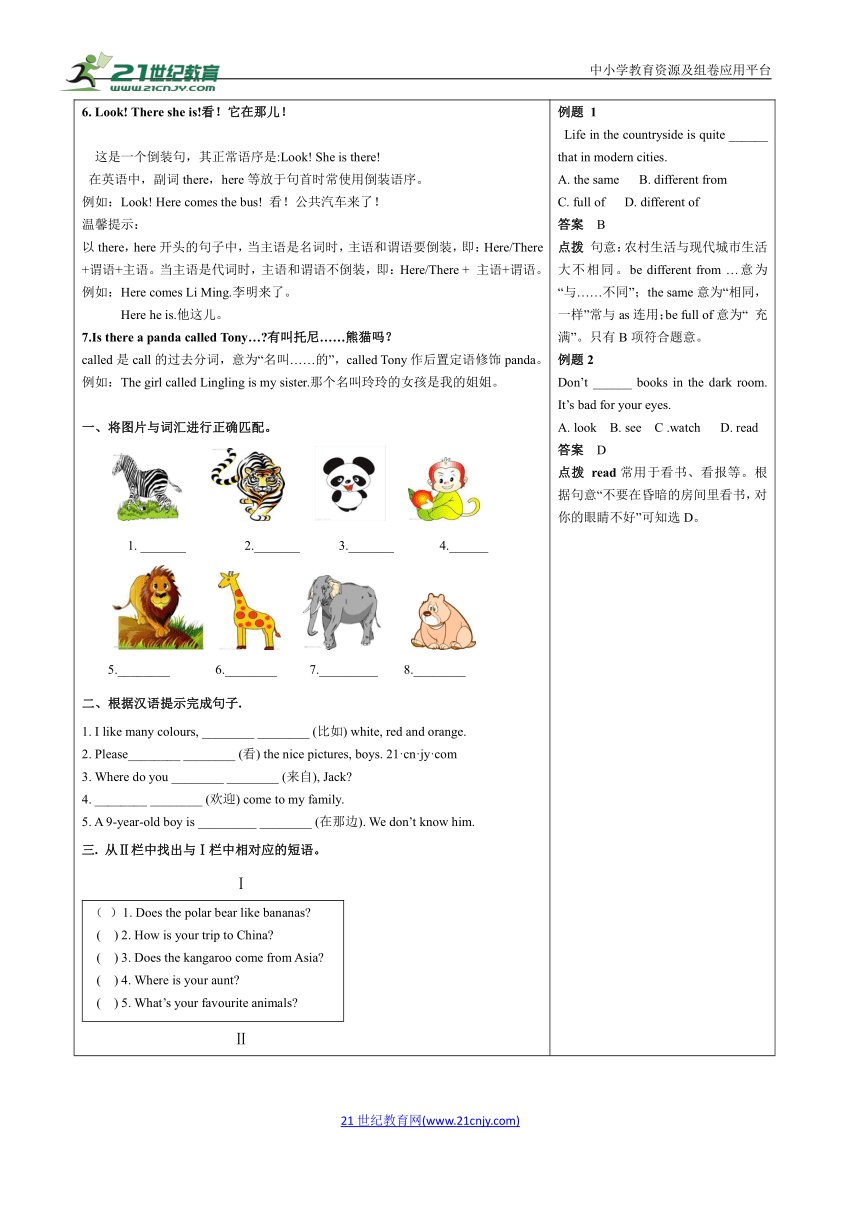
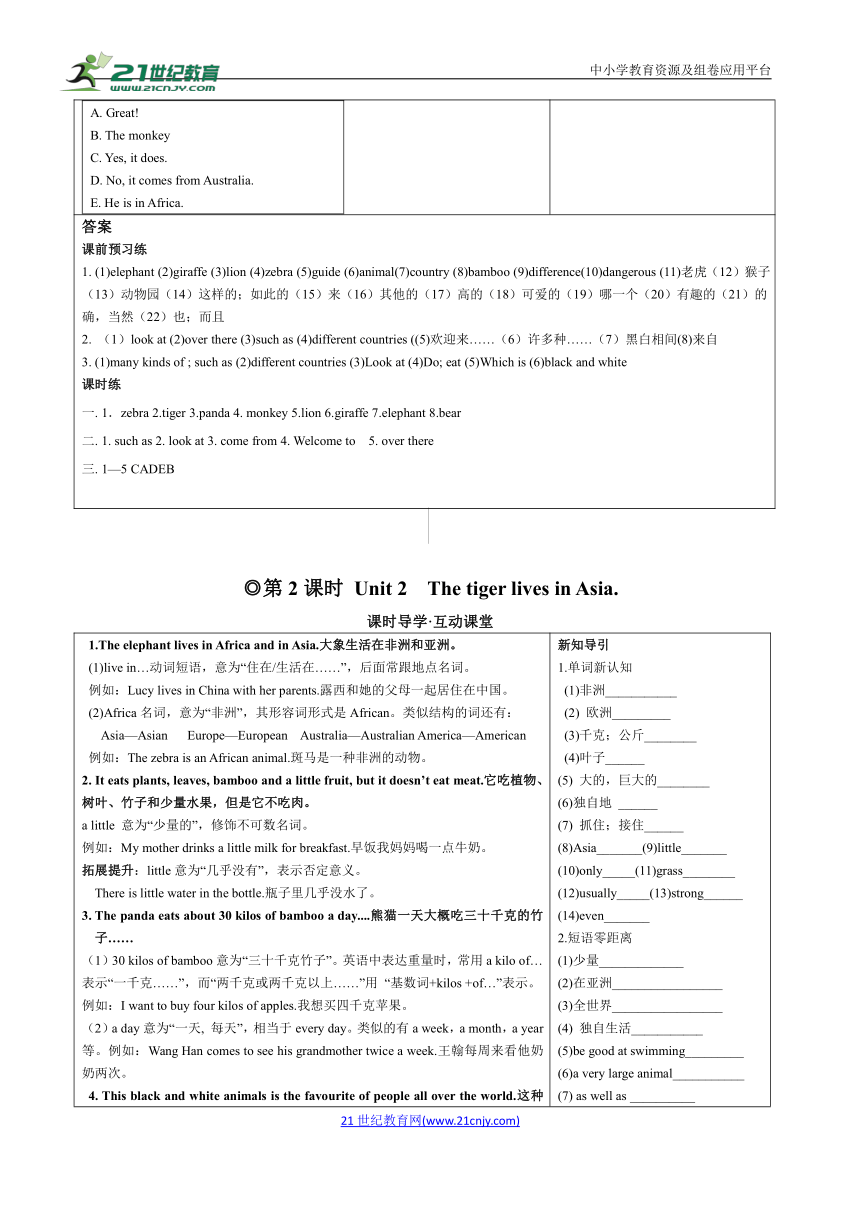
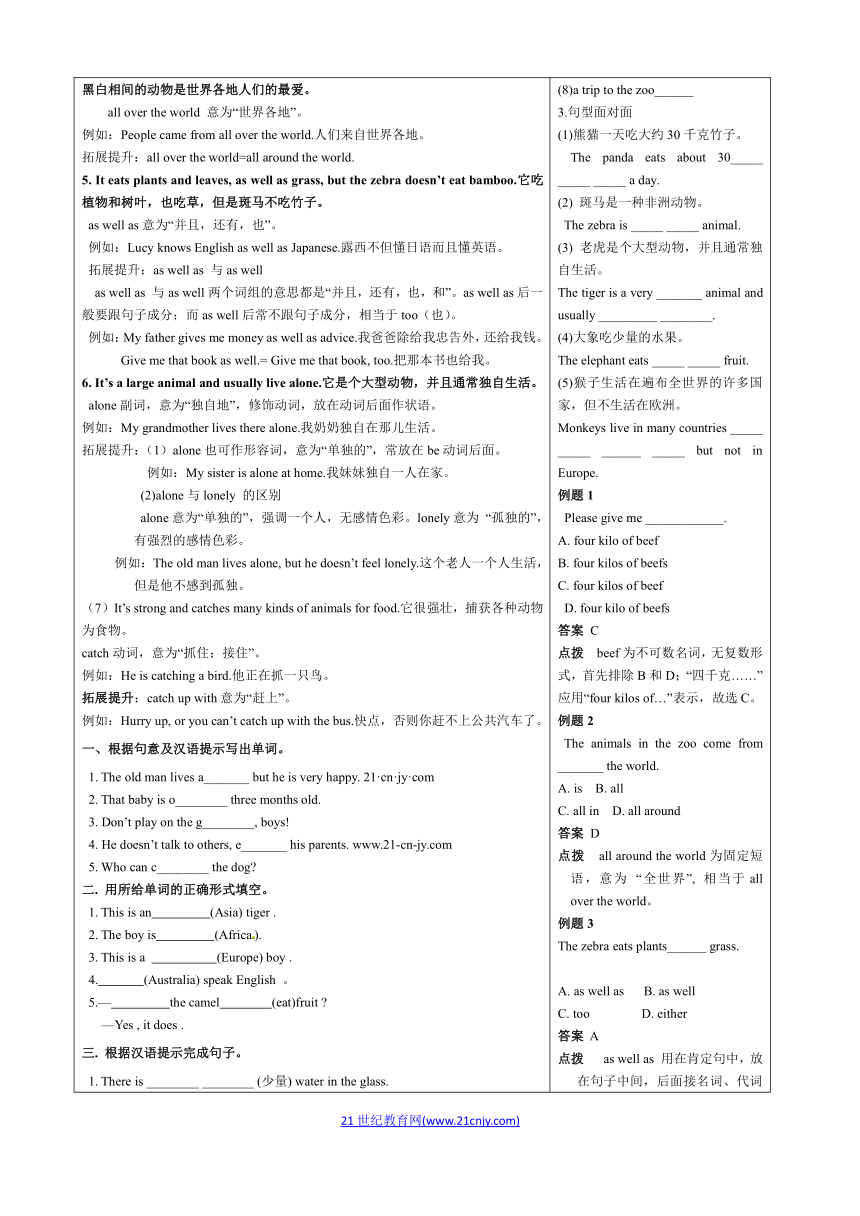
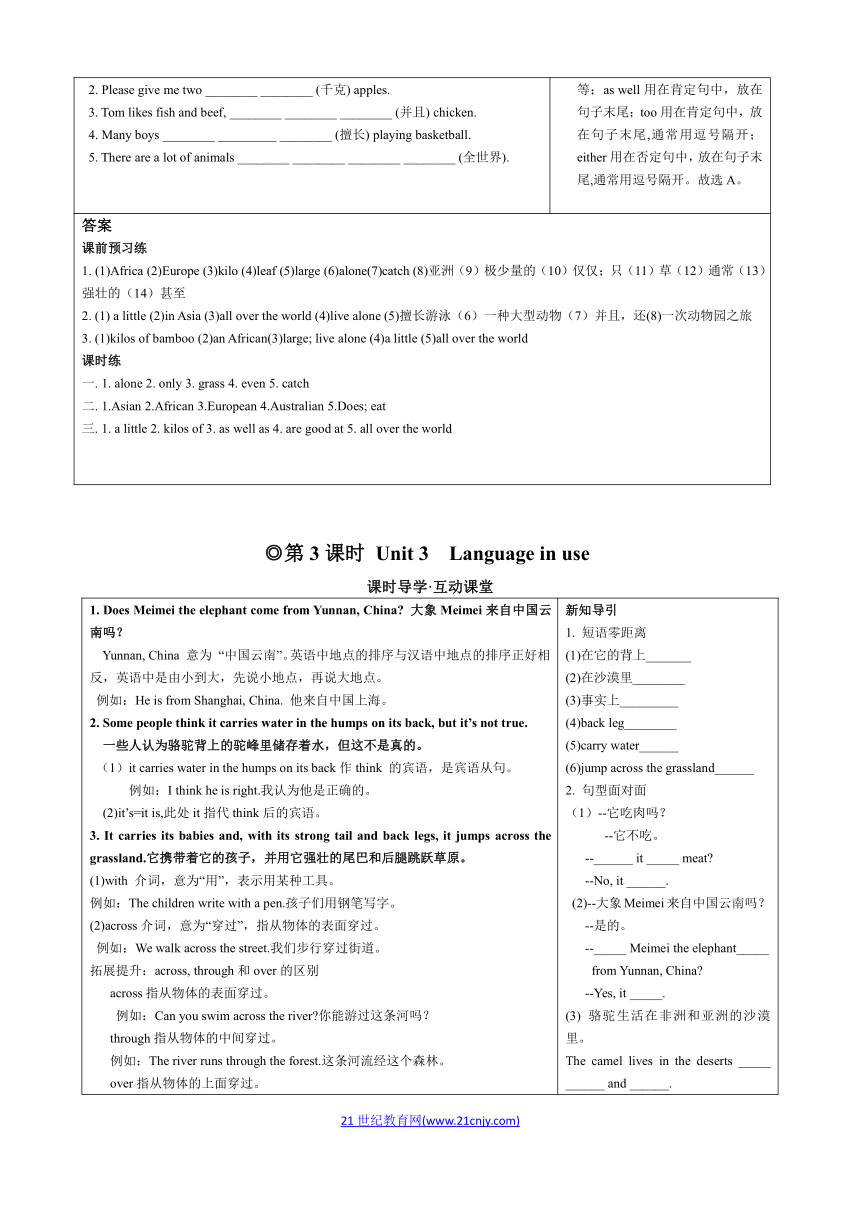
文档简介
中小学教育资源及组卷应用平台
Module 6 A trip to the zoo
◎第1课时 Unit 1 Does it eat meat?
课时导学·互动课堂
1. Welcome to Beijing Zoo.欢迎到北京动物园。(1)welcome to…意为“欢迎到……”。例如:Welcome to our school.欢迎到我们学校。 (2)zoo可数名词,意为“动物园”,其复数形式为zoos。例如:There is a zoo in the city.这个城市里有个动物园。2. The zoo has many kinds of animals, such as bears, zebras, giraffes and pandas.动物园有许多种动物,比如熊、斑马、长颈鹿和熊猫。 (1)many kinds of意为“许多种类的”。例如:He has many kinds of balls.他有许多种球。拓展提升:①a kind of意为“一种”; ②all kinds of意为“各种各样的”;③different kinds of意为“不同种类的”。例如:Panda is a kind of animal.熊猫是一种动物。 There are all kinds of books in the bookshop.这家书店有各种各样的书。 There are different kinds of plants in the park.公园里有不同种类的植物。 (2)such as意为“比如”,后面跟所列举的事物。例如:I like fruits such as apples, bananas and oranges.我喜欢水果,比如苹果、香蕉和桔子。3. They come from many different countries and they eat different food.它们来自许多不同的国家,吃不同的食物。different形容词,意为“不同的”,后跟可数名词时用复数形式。例如:We come from different schools.我们来自不同的学校。拓展提升:be different from…与……不同 例如:Our school is different from their school.我们学校不同于他们学校。4. Look at this elephant.看这头大象。 look at.. 意为“看……”。 例如:Look at the blackboard.看黑板。拓展提升:look at, see, watch, read的区别 look at指集中注意力地看,是有意的,强调“看”的动作。 例如:Look at the cat.看那只猫。 see意为“看见”,强调“看”的结果。 例如:I see a bird in the tree.我在树上看到一只鸟。 watch强调“专注地看”,有欣赏的意味,常用于看电视、看球赛等。 例如:He watches TV at night.他在晚上看电视。 read指阅读,常用于看书、看报等。 例如:I often read books at home.我常常在家看书。5.She’s the blck and white animal over there.她是那边那个黑白相间的动物。over there意为“在那边”。例如:You can hang your coat over there.你可以把大衣挂在那里。6. Look! There she is!看!它在那儿! 这是一个倒装句,其正常语序是:Look! She is there! 在英语中,副词there,here等放于句首时常使用倒装语序。例如:Look! Here comes the bus! 看!公共汽车来了!温馨提示:以there,here开头的句子中,当主语是名词时,主语和谓语要倒装,即:Here/There +谓语+主语。当主语是代词时,主语和谓语不倒装,即:Here/There + 主语+谓语。例如:Here comes Li Ming.李明来了。 Here he is.他这儿。7.Is there a panda called Tony…?有叫托尼……熊猫吗?called是call的过去分词,意为“名叫……的”,called Tony作后置定语修饰panda。例如:The girl called Lingling is my sister.那个名叫玲玲的女孩是我的姐姐。 一、将图片与词汇进行正确匹配。 (?http:?/??/?www.21cnjy.com?) (?http:?/??/?www.21cnjy.com?) (?http:?/??/?www.21cnjy.com?) (?http:?/??/?www.21cnjy.com?) 1. _______ 2._______ 3._______ 4.______ (?http:?/??/?www.21cnjy.com?) (?http:?/??/?www.21cnjy.com?) (?http:?/??/?www.21cnjy.com?) (?http:?/??/?www.21cnjy.com?)5.________ 6.________ 7._________ 8.________二、根据汉语提示完成句子.1. I like many colour (?http:?/??/?www.21cnjy.com?)s, ________ ________ (比如) white, red and orange. 2. Please________ ________ (看) the nice pictures, boys. 21·cn·jy·com 3. Where do you ________ ________ (来自), Jack? 4. ________ ________ (欢迎) come to my family. 5. A 9-year-old boy is _________ ________ (在那边). We don’t know him. 三. 从Ⅱ栏中找出与Ⅰ栏中相对应的短语。 Ⅰ( )1. Does the polar bear like bananas? ( ) 2. How is your trip to China? ( ) 3. Does the kangaroo come from Asia? ( ) 4. Where is your aunt? ( ) 5. What’s your favourite animals? ⅡA. Great! B. The monkey C. Yes, it does. D. No, it comes from Australia. E. He is in Africa. 新知导引1.单词新认知 (1)大象_______(2)长颈鹿________ (3) 狮子_______(4)斑马______ (5)导游______ (6)动物______ (7)国家_______ (8)竹子 _________ (9)不同的______(10)危险的_______ (11)tiger______ (12)monkey_______ (13)zoo______(14)such_______ (15)come _______ (16)other______ (17)tall________(18)cute ______ (19)which_________(20)funny_______ (21)sure_______ (22)also________ 2.短语零距离 (1) 看________ (2)在那边,在那里____________ (3)比如____________ (4) 不同的国家_____________ (5)welcome to…___________ (6) many kinds of …__________ (7)black and white_________ (8)come from___________ 3.句型面对面 (1)动物园有许多种动物,比如熊、斑马、长颈鹿和熊猫。 The zoo has ______ _____ _____ animals, ____ ____ bears, zebras, giraffes and pandas. (2)它们来自许多不同的国家。 They come from many _____ ____. (3)看这头大象。 _________ ____ this elephant. (4)熊猫吃植物和树叶吗? _______ pandas _______ plants and leaves? (5)哪个是熊猫玲玲? ______ _____ Lingling the panda? (6)熊猫是黑白相间的。 Pandas are ______ ________ _______.例题 1 Life in the countryside is quite ______ that in modern cities. A. the same B. different from C. full of D. different of 答案 B点拨 句意:农村生活与现代城市生活大不相同。be different from …意为“与……不同”;the same意为“相同,一样”常与as连用;be full of意为“ 充满”。只有B项符合题意。例题2 Don’t ______ books in the dark room. It’s bad for your eyes. A. look B. see C .watch D. read答案 D点拨 read常用于看书、看报等。根据句意“不要在昏暗的房间里看书,对你的眼睛不好”可知选D。
答案课前预习练1. (1)elephant (2)giraffe (3)lion (4)zebra (5)guide (6)animal(7)country (8)bamboo (9)difference(10)dangerous (11)老虎(12)猴子(13)动物园(14)这样的;如此的(15)来(16)其他的(17)高的(18)可爱的(19)哪一个(20)有趣的(21)的确,当然(22)也;而且 2. (1)look at (2)over there (3)such as (4)different countries ((5)欢迎来……(6)许多种……(7)黑白相间(8)来自 3. (1)many kinds of ; such as (2)different countries (3)Look at (4)Do; eat (5)Which is (6)black and white课时练一. 1.zebra 2.tiger 3.panda 4. monkey 5.lion 6.giraffe 7.elephant 8.bear二. 1. such as 2. look at 3. come from 4. Welcome to 5. over there三. 1—5 CADEB
◎第2课时 Unit 2 The tiger lives in Asia.
课时导学·互动课堂
1.The elephant lives in Africa and in Asia.大象生活在非洲和亚洲。(1)live in…动词短语,意为“住在/生活在……”,后面常跟地点名词。例如:Lucy lives in China with her parents.露西和她的父母一起居住在中国。 (2)Africa名词,意为“非洲”,其形容词形式是African。类似结构的词还有: Asia—Asian Europe—European Australia—Australian America—American 例如:The zebra is an African animal.斑马是一种非洲的动物。2. It eats plants, leaves, bamboo and a little fruit, but it doesn’t eat meat.它吃植物、树叶、竹子和少量水果,但是它不吃肉。a little 意为“少量的”,修饰不可数名词。例如:My mother drinks a little milk for breakfast.早饭我妈妈喝一点牛奶。拓展提升:little意为“几乎没有”,表示否定意义。 There is little water in the bottle.瓶子里几乎没水了。3. The panda eats about 30 kilos of bamboo a day....熊猫一天大概吃三十千克的竹子……(1)30 kilos of bamboo意为“三十千克竹子”。英语中表达重量时,常用a kilo of…表示“一千克……”,而“两千克或两千克以上……”用 “基数词+kilos +of…”表示。例如:I want to buy four kilos of apples.我想买四千克苹果。(2)a day意为“一天, 每天”,相当于every day。类似的有a week,a month,a year等。例如:Wang Han comes to see his grandmother twice a week.王翰每周来看他奶奶两次。 4. This black and white animals is the favourite of people all over the world.这种黑白相间的动物是世界各地人们的最爱。all over the world 意为“世界各地”。例如:People came from all over the world.人们来自世界各地。 拓展提升:all over the world=all around the world.5. It eats plants and leaves, as well as grass, but the zebra doesn’t eat bamboo.它吃植物和树叶,也吃草,但是斑马不吃竹子。as well as意为“并且,还有,也”。例如:Lucy knows English as well as Japanese.露西不但懂日语而且懂英语。拓展提升:as well as 与as well as well as 与as well两个词组的意思都是“并且,还有,也,和”。as well as后一般要跟句子成分;而as well后常不跟句子成分,相当于too(也)。例如:My father gives me money as well as advice.我爸爸除给我忠告外,还给我钱。 Give me that book as well.= Give me that book, too.把那本书也给我。 6. It’s a large animal and usually live alone.它是个大型动物,并且通常独自生活。 alone副词,意为“独自地”,修饰动词,放在动词后面作状语。例如:My grandmother lives there alone.我奶奶独自在那儿生活。拓展提升:(1)alone也可作形容词,意为“单独的”,常放在be动词后面。 例如:My sister is alone at home.我妹妹独自一人在家。 (2)alone与lonely 的区别 alone意为“单独的”,强调一个人,无感彩。lonely意为 “孤独的”,有强烈的感彩。例如:The old man lives alone, but he doesn’t feel lonely.这个老人一个人生活,但是他不感到孤独。(7)It’s strong and catches many kinds of animals for food.它很强壮,捕获各种动物为食物。 catch动词,意为“抓住;接住”。例如:He is catching a bird.他正在抓一只鸟。拓展提升:catch up with意为“赶上”。例如:Hurry up, or you can’t catch up with the bus.快点,否则你赶不上公共汽车了。一、根据句意及汉语提示写出单词。1. The old man lives a_______ but he is very happy. 21·cn·jy·com 2. That baby is o________ three months old. 3. Don’t play on the g________, boys! 4. He doesn’t talk to others, e_______ his parents. www.21-cn-jy.com 5. Who can c________ the dog? 二. 用所给单词的正确形式填空。1. This is an (Asia) tiger . 2. The boy is (Africa). 3. This is a (Europe) boy . 4. (Australia) speak English 。 5.— the camel (eat)fruit ? —Yes , it does . 三. 根据汉语提示完成句子。1. There is ________ ________ (少量) water in the glass. 2. Please give me two ________ ________ (千克) apples. 3. Tom likes fish and beef, ________ ________ ________ (并且) chicken. 4. Many boys ________ _________ ________ (擅长) playing basketball. 5. There are a lot o (?http:?/??/?www.21cnjy.com?)f animals ________ ________ ________ ________ (全世界). 新知导引1.单词新认知 (1)非洲___________ (2) 欧洲_________ (3)千克;公斤________ (4)叶子______ (5) 大的,巨大的________ (6)独自地 ______ (7) 抓住;接住______ (8)Asia_______(9)little_______ (10)only_____(11)grass________ (12)usually_____(13)strong______ (14)even_______ 2.短语零距离 (1)少量_____________ (2)在亚洲_________________ (3)全世界_________________ (4) 独自生活___________ (5)be good at swimming_________ (6)a very large animal___________ (7) as well as __________ (8)a trip to the zoo______ 3.句型面对面 (1)熊猫一天吃大约30千克竹子。 The panda eats about 30_____ _____ _____ a day. (2) 斑马是一种非洲动物。 The zebra is _____ _____ animal. (3) 老虎是个大型动物,并且通常独自生活。 The tiger is a very _______ animal and usually _________ ________. (4)大象吃少量的水果。 The elephant eats _____ _____ fruit. (5)猴子生活在遍布全世界的许多国家,但不生活在欧洲。 Monkeys live in many countries _____ _____ ______ _____ but not in Europe. 例题1 Please give me ____________. A. four kilo of beef B. four kilos of beefs C. four kilos of beef D. four kilo of beefs 答案 C点拨 beef为不可数名词,无复数形式,首先排除B和D;“四千克……”应用“four kilos of…”表示,故选C。例题2 The animals in the zoo come from _______ the world. A. is B. all C. all in D. all around答案 D点拨 all around the world为固定短语,意为 “全世界”, 相当于all over the world。 例题3 The zebra eats plants______ grass. A. as well as B. as well C. too D. either答案 A点拨 as well as 用在肯定句中,放在句子中间,后面接名词、代词等;as well用在肯定句中,放在句子末尾;too用在肯定句中,放在句子末尾,通常用逗号隔开;either用在否定句中,放在句子末尾,通常用逗号隔开。故选A。
答案课前预习练1. (1)Africa (2)Europe (3)kilo (4)leaf (5)large (6)alone(7)catch (8)亚洲(9)极少量的(10)仅仅;只(11)草(12)通常(13)强壮的(14)甚至 2. (1) a little (2)in Asia (3)all over the world (4)live alone (5)擅长游泳(6)一种大型动物(7)并且,还(8)一次动物园之旅 3. (1)kilos of bamboo (2)an African(3)large; live alone (4)a little (5)all over the world课时练一. 1. alone 2. only 3. grass 4. even 5. catch二. 1.Asian 2.African 3.European 4.Australian 5.Does; eat 三. 1. a little 2. kilo (?http:?/??/?www.21cnjy.com?)s of 3. as well as 4. are good at 5. all over the world
◎第3课时 Unit 3 Language in use
课时导学·互动课堂
1. Does Meimei the elephant come from Yunnan, China? 大象Meimei来自中国云南吗? Yunnan, China 意为 “中国云南”。英语中地点的排序与汉语中地点的排序正好相反,英语中是由小到大,先说小地点,再说大地点。例如:He is from Shanghai, China. 他来自中国上海。2. Some people think it carries water in the humps on its back, but it’s not true. 一些人认为骆驼背上的驼峰里储存着水,但这不是真的。 (1)it carries water in the humps on its back作think 的宾语,是宾语从句。例如:I think he is right.我认为他是正确的。 (2)it’s=it is,此处it指代think后的宾语。3. It carries its babies and, with its strong tail and back legs, it jumps across the grassland.它携带着它的孩子,并用它强壮的尾巴和后腿跳跃草原。(1)with 介词,意为“用”,表示用某种工具。例如:The children write with a pen.孩子们用钢笔写字。 (2)across介词,意为“穿过”,指从物体的表面穿过。 例如:We walk across the street.我们步行穿过街道。拓展提升:across, through和over的区别 across指从物体的表面穿过。例如:Can you swim across the river?你能游过这条河吗? through指从物体的中间穿过。例如:The river runs through the forest.这条河流经这个森林。 over指从物体的上面穿过。例如:The boy jumps over the wall quickly.那个男孩迅速地跳过那面墙。一. 根据句意和首字母提示完成单词。1.Tony's grandpa can make kites(风筝) with paper and b______. 2. There are a lot of trees in the f______. 3.G______ have long necks(脖子). 4. L______ will fall down from the trees in autumn. 5.The camel lives in the d______.二、用所给词的适当形式填空.1. Daming (like)to go to Beijing Zoo on Sunday. 2. Look, there (be)two zebras over there. 3. I have a friend (call)Li Yaru. 4. Xiaowang often (catch)fish in the river. 5. Our school (have)two American teachers. 三. 单项选择。1. Mum is going to buy . A. two kilo of meat B. two kilo of meats C. two kilos of meat D. two kilos of meats2. Tigers eat fruit and monkeys eat meat. A. don’t; doesn’t B. doesn’t; don’t C. don’t; don’t D. aren’t; aren’t3. — animals are there in the zoo? —About three hundred. A. How B. What C. How much D. How many 4. —Where the kangaroo come from? —It from Australia. A. do; comes B. do; come C. does; comes D. does; come 5. There an elephant, two monkeys and three snakes in the zoo. A. be B. are C. is D. am 新知导引1. 短语零距离 (1)在它的背上_______ (2)在沙漠里________ (3)事实上_________ (4)back leg________ (5)carry water______ (6)jump across the grassland______ 2. 句型面对面(1)--它吃肉吗? --它不吃。 --______ it _____ meat? --No, it ______. (2)--大象Meimei来自中国云南吗? --是的。 --_____ Meimei the elephant_____ from Yunnan, China? --Yes, it _____. (3) 骆驼生活在非洲和亚洲的沙漠里。 The camel lives in the deserts _____ ______ and ______. (4)袋鼠是一种澳大利亚的动物。 The kangaroo is _____ _____ animal.例题1 My mother is cutting an apple ______ the knife. A. to B. for C. of D. with答案 D点拨 句意:我妈妈正在用小刀切苹果。with意为“用”,表示用某种工具。故选D。例题2 Look! The dog is running ______ the street. A. across B. over C. through D. on答案 A点拨 across意为“穿过”,指从物体的表面穿过; through意为“穿过”,指从物体的中间穿过;over意为“穿过”,指从物体的上面穿过;on意为“在……上面”。故选A。
答案课前预习练1. (1)on its back(2)in the desert (3)in fact (4)后腿(5)储存水(6)跳跃草原 2. (1)Does; eat; doesn’t (2)Does; come; does (3)of Africa; Asia (4)an Australian课时练一.1. bamboo 2. forest 3. Giraffes 4. Leaves 5. desert二. 1. likes 2. are 3. called 4. catches 5. has三. 1~5 CCDCC
模块专题突破
行为动词的一般现在时(二)主语是第三人称单数时,行为动词的一般现在时的各种句式变换总结如下:肯定否定疑问回答 The tiger eats meat. (1)The tiger _____/ _____ _____ meat. (2)_____ the tiger ________ meat? (3)Yes, it _____./ No, it ______. He speaks English well. (4)He _____ /____ ____ English well. (5)____ he ____ English well? (6) Yes, he _____./ No, he ______. She lives in the city. (7)She ____/____ ____ in the city. (8)_____ she ____ in the city? (9)Yes, she _____./ No, she ______. 由上表可知,主语是第三人称单数的行为动词的一般现在时,变一般疑问句和否定句时可遵循下面步骤:一加。变一般疑问句在句首加助动词Does;变否定句在行为动词前加doesn’t。二改。在句首加助动词Does或在行为动词前加doesn’t 后,行为动词必须改为原形。三问号。在在句首加助动词Does改为一般疑问句后,将原句句末的句号改为问号。例如:John likes playing football.约翰喜欢踢足球。 (10)John _____ ____ playing football. 约翰不喜欢踢足球。(11)______ John _____ playing football? 约翰喜欢踢足球吗? (12)Yes, he _____. /No, he ______. 一、单项选择。1. He often TV on Friday evening . A. look B. see C. watch D. watches 2. She to the movies with her friends on weekends . A. go B. going C. to go D. goes 3. Jim also a computer . A. have B. has C. is D be 4. your mother_____ this book ? A Do , like B Does , like C Do , likes D Does , likes 5. —Does Tom get up very late ? — A Yes , he doesn’t . B Yes , he does . C No , Tom doesn’t . D No , he does . 6. The boy go to school this afternoon . A doesn’t B don’t C aren’t D isn’t二、用所给单词的正确形式填空.1.The snake (come) from America . 2. The monkey (eat) fruit . 3. The panda ______(not eat) meat. 4.The wolf (not live) in the European forests.三、句型转换。 1.He goes to the zoo at 9:00 o’clock (改为否定句) He _____ _____ to school at 9:00 o’clock . 2. Tom has a maths lesson on Wednesday.(改为否定句) Tom ______ ____ a maths lesson on Wednesday. 3.He has some meat for breakfast .(改为一般疑问句,并做肯定回答) --______ he _______ some meat for breakfast? --Yes, ____ _____. 4. The panda likes bamboo. (改为一般疑问句,并做否定回答) --______ the panda ______ bamboo? --No, _____ ______.
专题归纳·语法透析
(1)does not/ doesn’t eat (2)Does; eat (3)does; doesn’t (4) does not/ doesn’t speak(5)Does; speak (6)does; doesn’t (7) does not/ doesn’t live (8)Does; live (9)does; doesn’t
(10)doesn’t like (11)Does; like (12)does; doesn’t
语法练习
一、1—6 DDBBBA
二、1.comes 2.eats 3.doesn’t eat 4.doesn’t live
三、1.doesn’t go 2.doesn’t have 3.Does; have; he does 4. Does; like; it doesn’t
专题讲座·聚焦写作
写作素材
1. There is …有……
2. take sb there 带某人去那里
3. many kinds of许多种类的
4. in the zoo在动物园里
5. such as 比如
6. be free自由的
典型例题
根据下面的提示写一篇短文,不得少于60词。
提示:我们城市有一个大动物园,我妈妈在周末经常带我去那里。那儿有很多动物,比如大象、老虎、熊猫、猴子、狮子和长颈鹿。我认为这些动物不快乐,它们应该生活在森林中,它们应该享受自由。
____________________________________________________________________________________________________________________________________________________________________________________________________________________________________________________________________________________________________________________________________________________________________________
范文 There is a big zoo in our city. (1)At weekends, my mother often takes me there. I see (2)many kinds of animals in the zoo, (3)such as elephant, tigers, pandas, monkeys, lions and giraffes. My favourite animals are monkeys, because they are cute.(4)I don’t think they are happy. They should be free. They should live in the forest. 点评 (1) at weekends意为“在周末”。(2)many kinds of意为“许多种类”。后跟可数名词的复数形式。 (3) such as意为“比如”。后面跟所列举的事物。 (4)I think + that从句,变否定句时,要否定主句,即否定前置。 (5)be free意为“自由的”。
练习
你曾经去动物园看过动物吗?请你介绍一下自己最喜欢的一种动物。
要求:1.以My Favourite Animal为题,围绕主题展开;
2.语句通顺,表意贴切,无语法错误;
3.不少于60词。
_______________________________________________________________________________
_______________________________________________________________________________
_______________________________________________________________________________
_______________________________________________________________________________
One possible version:
My Favourite Animal
My favourite animal is pandas. They are nice and lovely. You can see them in many zoos in the world. They all come from China. They like eating bamboo and they can eat 15 kilos of bamboo a day. When we see them,they are always eating. Pandas are white and black and their eyes,ears and legs are black. They look very smart. Many people like them. Do you love pandas?
HYPERLINK "http://21世纪教育网(www.21cnjy.com)
" 21世纪教育网(www.21cnjy.com)
同课章节目录
- Starte
- Module 1 My teacher and my friends
- Module 2 My English lesson
- Module 3 My English book
- Module 4 My everyday life
- Module 1 My classmates
- Unit 1 Nice to meet you.
- Unit 2 I'm Wang Lingling and I'm thirteen years ol
- Unit 3 Language in use.
- Module 2 My family
- Unit 1 Is this your mum?
- Unit 2 These are my parents.
- Unit 3 Language in use.
- Module 3 My school
- Unit 1 There are thirty students in my class.
- Unit 2 The library is on the left of the playgroun
- Unit 3 Language in use.
- Module 4 Healthy food
- Unit 1 We've got lots of apples.
- Unit 2 Is your food and drink healthy?
- Unit 3 Language in use.
- Module 5 My school day
- Unit 1 I love history.
- Unit 2 We start work at nine o'clock.
- Unit 3 Language in use.
- Revision module A
- Module 6 A trip to the zoo
- Unit 1 Does it eat meat?
- Unit 2 The tiger lives in Asia.
- Unit 3 Language in use.
- Module 7 Computers
- Unit 1 How do I write my homework on the computer?
- Unit 2 When do you use a computer?
- Unit 3 Language in use.
- Module 8 Choosing presents
- Unit 1 I always like birthday parties.
- Unit 2 She often goes to concerts.
- Unit 3 Language in use.
- Module 9 People and places
- Unit 1 We're enjoying the school trip a lot.
- Unit 2 They're waiting for buses or trains.
- Unit 3 Language in use.
- Module 10 Spring Festival
- Unit 1 Are you getting ready for Spring Festival?
- Unit 2 My mother's cleaning our houses and sweepin
- Unit 3 Language in use.
- Revision module B
